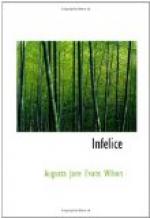On that same day, but a few hours earlier, she had perused these pages, wondering how the unknown gifted poetess beyond the sea had so accurately etched the suffering in her own young heart, the loneliness and misery that seemed coiled in the future like serpents in a lair. Now, holding that bruised palpitating heart under the steel-clad heel of pride, she was calmly declaiming that portraiture of her own wretchedness, as any elocutionist might a grand passage from the “Antigone,” or “Prometheus.” Not a throb of pain was permitted to ripple the rich voice that uttered:
“But two are walking
apart for ever,
And wave their hands in a mute farewell.”
Farther on, nearing the close, Mr. Palma observed a change in the countenance, a quick gleam in the eyes, a triumphant ring in the deep and almost passionate tone that cried exultingly:
“Only my heart to my
heart will show it
As I walk desolate day by day.”
He leaned forward and touched the volume:
“Thank you. Give me the book. I should render the concluding verses very much as I heard them recently from my fair client, Mrs. Carew—so.”
In his remarkably clear, full, musical and carefully modulated voice he read the two remaining verses, then closed the volume and looked coolly across the table at the girl.
With what a flash her splendid eyes challenged his, and how proudly her tender lips curled, as with pitiless scorn she answered:
“Not so—oh, not so. Jean Ingelow would never recognize her own jewelled handiwork. She meant this, and any earnest woman who prized a faithful lover could not fail to read it aright.”
Her eyes sank till they rested on her ring, and slipping it to and fro upon her slender finger till the diamonds sparkled, she repeated with indescribable power and pathos:
“And yet I know, past
all doubting, truly,—
A knowledge greater than grief can dim—
I know, as he loved, he will love me duly,
Yea better, e’en better than I love
him.
And as I walk by the vast calm river,
The awful river so dread to see,
I say ’Thy breadth and thy depth for
ever—
Are bridged by his thoughts that cross
to me.’”
“Regina, do you interpret that the River of Death?”
She pointed to the jewels on her hand, and the blue eyes cold as steel met his.
“Only the river of death could have ‘divided’ Douglass and me.”
A frown overshadowed his massive brow, but he merely added composedly:
“I did not suspect until to-night that you were endowed with your mother’s histrionic talent. Some day you will rival her as an actress, and at least I may venture to congratulate you upon the fact that she will scarcely be disappointed in your dramatic skill.”
For nearly a moment, neither spoke.
“Mr. Palma, you have no objection, I hope, to my carrying mother’s portrait with me?”




